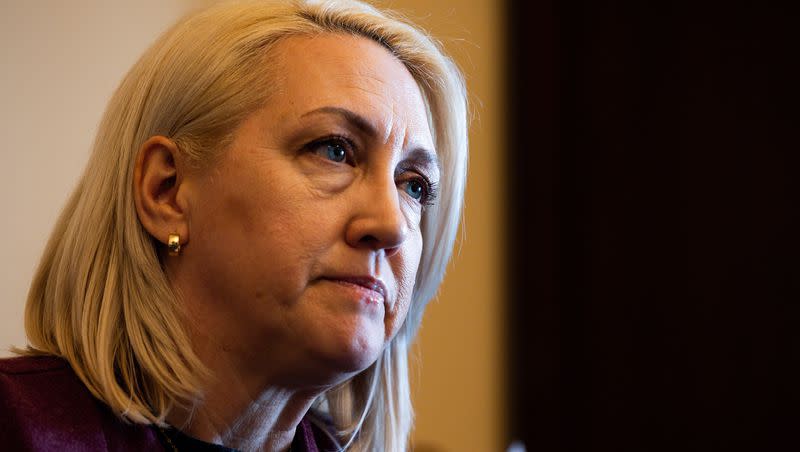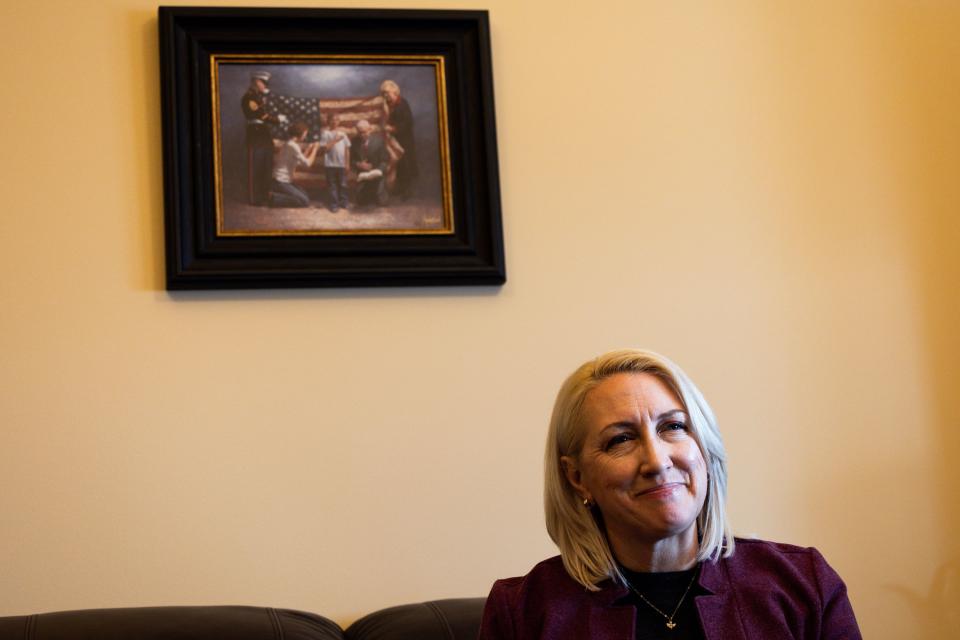Utah Supreme Court is weighing state’s abortion law. A new bill aims to simplify the legal issues

- Oops!Something went wrong.Please try again later.
As the Utah Supreme Court deals with questions over the constitutionality of the state’s abortion trigger law, a lawmaker is proposing changes to a bill passed last year on abortion clinic licensing requirements.
Utah House Majority Whip Karianne Lisonbee, R-Clearfield, has introduced HB560, which would repeal the requirement that abortions be performed in clinics with the same standards of care as hospitals.
The bill might seem strange coming from a self-described pro-life lawmaker, but Lisonbee said the aim of the bill is to simplify the issues related to abortion before the court, with the hope that it would speed up clearance of the state’s trigger law.
“I will always stand on the side of life,” Lisonbee said, adding that throughout her years in the Utah Legislature, she’s supported efforts to require fathers of babies to pay child support during pregnancy and tax credits for women who need extra fertility services.
This latest bill, she said, is a continuation of that effort.
Under Lisonbee’s newly proposed bill, some of the provisions from her 2023 legislation would remain. “That bill made several important policy changes and clarifications to protect both the sanctity of life and pregnant women who are experiencing rare and dangerous complications during pregnancy. And that is important because those provisions remain in the bill and they will not be repealed,” Lisonbee said in an interview with the Deseret News.
After the reversal of Roe v. Wade, Utah’s SB174, sponsored by Lisonbee in 2020, went into effect on June 24, 2022. This law, commonly referred to as a “trigger law,” prohibited abortions except in the following cases: if the pregnancy is the result of rape or incest, if the mother’s health is severely at risk or if two physicians who practice maternal fetal medicine determine the fetus has a lethal defect or severe brain abnormality.
After the law went into effect, lawyers representing the Planned Parenthood Association of Utah challenged it in court and a judge granted a preliminary injunction. This means abortion is currently legal in Utah up until 18 weeks of pregnancy, and SB174 was blocked for the time being.
Mary Taylor, president of Pro-Life Utah, issued a statement in support of Lisonbee’s latest bill. “Pro-Life Utah fully supports HB560. We were in full support of HB467 passed by the Utah State Legislature in 2023, which would have enhanced Utah’s abortion trigger law. Unfortunately, no one could have foreseen the delays in the Utah Supreme Court case regarding Utah’s trigger abortion law which along with the injunction of HB467, has led to the death of over 5,000 unborn babies. HB560 will simplify the issues before the Utah Supreme Court, potentially saving the lives of countless babies.”
Kathryn Boyd, president and CEO of Planned Parenthood Association of Utah, said in a statement that they wanted to move past “government overreach and constant litigation.”
“As the state’s largest sole provider of sexual and reproductive health care, we trust people to make the best decisions for themselves and their families in consultation with their health care provider. We look forward to a future when all Utahns, including legislators, can retain their deeply held beliefs without jeopardizing the freedom, safety, and wellbeing of Utah families,” Boyd said.
When asked to explain HB560 in simple terms, Lisonbee said “It would simplify the issues of litigation and allow the courts to focus on reaching a ruling on the constitutionality of the underlying trigger law.” Essentially, if passed, it would shift the focus of the court squarely to the constitutionality of SB174 rather than looking at clinic licensing requirements as well.

HB467, signed into law by Gov. Spencer Cox on March 15, 2023, required abortions to be performed in hospitals with some exceptions. It prohibited the state from issuing a license for an abortion clinic after May 2, 2023. Lawyers for Planned Parenthood Association of Utah filed a supplemental complaint to the existing suit challenging HB467 as well.
Related
District Court Judge Andrew H. Stone issued a preliminary injunction against HB467, preventing it from going into effect. That meant abortion clinics could retain their licenses and abortions could still be performed in clinics.
“We created a new licensing structure in our state code so that anywhere where abortions were performed would have the same standards of care as a hospital, so that we were ensuring the utmost safety for women in Utah,” Lisonsbee said. “Those provisions were enjoined.”
Critics of HB467 said the bill would effectively prevent clinics from providing abortions. When the bill was originally passed, Karrie Galloway, then the president and CEO of Planned Parenthood Association of Utah, said the bill would “put abortion out of reach for as many Utahs as possible no matter what their faith, family and trusted medical providers decide is best for their safety and health.”
Lisonbee said if the court rules in favor of upholding SB174, then “there will no longer be elective abortion in the state of Utah” and the provisions repealed in HB467 “would probably be moot” as a result.
